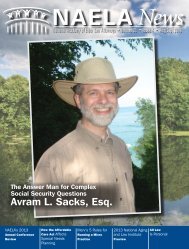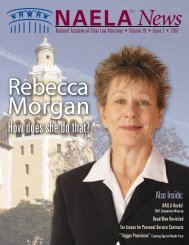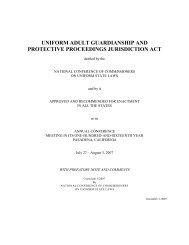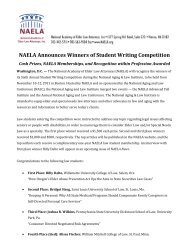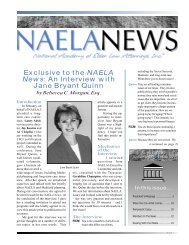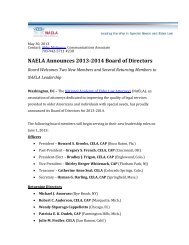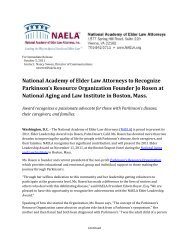N A E L A - National Academy of Elder Law Attorneys
N A E L A - National Academy of Elder Law Attorneys
N A E L A - National Academy of Elder Law Attorneys
Create successful ePaper yourself
Turn your PDF publications into a flip-book with our unique Google optimized e-Paper software.
Vermont’s Long-<br />
Term Care Waiver<br />
(continued from page 20)<br />
munity-based services so that<br />
some <strong>of</strong> those who are eligible<br />
for nursing facility coverage<br />
may avoid institutionalization.<br />
2 The Vermont Long-Term Care<br />
Plan: A Demonstration Waiver<br />
Proposal to the Centers for<br />
Medicare and Medicaid<br />
Services, October 1, 2003<br />
(pages 2-4).<br />
3 The Vermont Long-Term Care<br />
Plan: A Demonstration Waiver<br />
Proposal to the Centers for<br />
Medicare and Medicaid<br />
Services, October 1, 2003<br />
(page 4).<br />
4 Like the highest need and high<br />
need categories, the moderate<br />
need category allows individuals<br />
with income up to 300% <strong>of</strong><br />
the federal poverty level to<br />
qualify for coverage. But while<br />
federal law allows a state to<br />
provide coverage to individuals<br />
at that level <strong>of</strong> income if they<br />
need long-term care, 42 U.S.C.<br />
§1396a(a)(10)(A)(ii)(V) and<br />
(VI), no authority exists, absent<br />
the waiver, for having Medicaid<br />
provide services to individuals<br />
at that income who are merely<br />
at risk <strong>of</strong> long-term care.<br />
5 42 U.S.C. §1396a(a)(10)<br />
6 Because the state asked for a<br />
waiver <strong>of</strong> Medicaid’s reasonable<br />
promptness requirement, 42<br />
U.S.C. §1396a(a)(8), the state<br />
may place a Medicaid beneficiary<br />
on a waiting list.<br />
7 Standard for high need is the<br />
same as it was before, so,<br />
essentially, the state is requiring<br />
a higher level <strong>of</strong> need to<br />
prove entitlement to coverage<br />
for services<br />
8 The state efforts have come in<br />
the form <strong>of</strong> Section 1115<br />
waivers, none <strong>of</strong> which have<br />
been approved by HHS. With<br />
regard to the impact <strong>of</strong> one <strong>of</strong><br />
Congress’ original proposals to<br />
change the transfer rules, the<br />
Congressional Budget Office<br />
(CBO) estimated that 120,000<br />
individuals would have their<br />
Medicaid eligibility at least<br />
“delayed” as a result <strong>of</strong> the<br />
House <strong>of</strong> Representatives’ proposal.<br />
See Additional<br />
Information on CBO’s Estimate<br />
for the Medicaid Provisions in<br />
H.R. 4241, the Deficit<br />
Reduction Act <strong>of</strong> 2005,<br />
November 9, 2005.<br />
Discussions <strong>of</strong> Fees<br />
By Hugh K. Webster, Esq.<br />
NAELA Legal Counsel<br />
How many<br />
compete?<br />
What is the<br />
extent <strong>of</strong> that<br />
competition?<br />
Interesting<br />
questions<br />
perhaps...<br />
I would like to provide<br />
some further clarification<br />
on the topic <strong>of</strong> discussions<br />
<strong>of</strong> fees at NAELA<br />
events and on NAELA<br />
email discussion lists.<br />
It has been suggested<br />
that NAELA members do<br />
not compete with each<br />
other, and therefore there are no<br />
restrictions on how members<br />
interact. From a factual standpoint,<br />
<strong>of</strong> course, this<br />
is not true. NAELA<br />
members compete<br />
with other NAELA<br />
members every day.<br />
How many compete?<br />
What is the extent<br />
<strong>of</strong> that competition?<br />
Interesting questions<br />
perhaps, but completely<br />
academic<br />
ones to federal regulators<br />
who wish to<br />
pursue an investigation.<br />
I know because<br />
I have been through these investigations.<br />
And they can be extremely<br />
burdensome in terms <strong>of</strong> expenditure<br />
<strong>of</strong> time, energy, focus, and<br />
<strong>of</strong> course money. This is true for<br />
the association itself and for the<br />
members that are targeted as<br />
well.<br />
Also bear in mind that the<br />
Sherman Antitrust Act is not the<br />
only trade regulation statute. For<br />
example, the Federal Trade<br />
Commission Act prohibits, among<br />
other things, “unfair” trade practices.<br />
“Unfair” is essentially whatever<br />
the Federal Trade<br />
Commission decides is unfair, and<br />
the FTC does not have to show, or<br />
even allege, actual harm to competition.<br />
Further, associations <strong>of</strong> pr<strong>of</strong>essionals<br />
are a favorite target<br />
<strong>of</strong> antitrust regulators.<br />
Organizations comprised<br />
<strong>of</strong> architects, physicians,<br />
engineers, social workers,<br />
dentists, etc. are some<br />
examples <strong>of</strong> those that<br />
have been investigated<br />
and successfully prosecuted<br />
(civilly) by the Department <strong>of</strong><br />
Justice or Federal Trade<br />
Commission. What would the<br />
reaction <strong>of</strong> the DOJ<br />
or FTC be if they<br />
heard <strong>of</strong> a national<br />
association <strong>of</strong> attorneys<br />
that sanctions<br />
fee discussions during<br />
sessions at its<br />
meetings or on<br />
email discussion<br />
lists? Frankly, it<br />
would be like waiving<br />
red meat in<br />
front a pack <strong>of</strong><br />
hungry dogs.<br />
Finally, <strong>of</strong><br />
course it can be very useful for<br />
competitors, or non-competitors<br />
in the same industry or pr<strong>of</strong>ession,<br />
to have information regarding<br />
what others are charging.<br />
This improves efficiency, etc. But<br />
the legal way to gather and disseminate<br />
this information - the<br />
way that has been sanctioned by<br />
the courts and the regulatory<br />
agencies - is by submission <strong>of</strong><br />
data to a third party, such as an<br />
association, that then compiles<br />
the data and reports it back in<br />
composite form. The data can be<br />
organized in several ways, including<br />
geographically, but the rates<br />
<strong>of</strong> individual practitioners are not<br />
revealed.<br />
I hope this information is<br />
helpful.<br />
21



